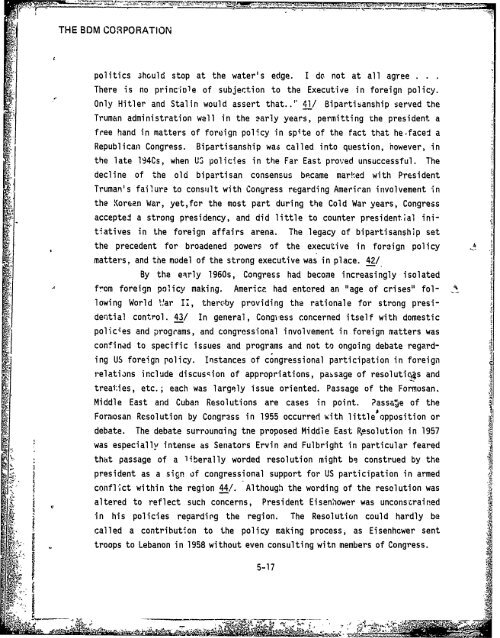policy - The Black Vault
policy - The Black Vault
policy - The Black Vault
Create successful ePaper yourself
Turn your PDF publications into a flip-book with our unique Google optimized e-Paper software.
THE BDM CORPORATION<br />
I<br />
politics should stop at the water's edge. I do not at all agree .<br />
<strong>The</strong>re is no princiDle of subjection to the Executive in foreign <strong>policy</strong>.<br />
Only Hitler and Stalin would assert that.." 4.1/<br />
Bipartisanship served the<br />
Truman administration well in the .arly years, permitting the president a<br />
free hand in matters of foreign <strong>policy</strong> in spite of the fact that he-facel a<br />
F<br />
j<br />
Republican Congress.<br />
Bipartisanship was called into question, however, in<br />
the late 194Cs, when US policies in the Far East proved unsuccessful. <strong>The</strong><br />
decline of the old bipartisan consensus became marked with President<br />
Truman's failure to consult with Congress regarding Ameriran involvement in<br />
the Korean War, yet,fcr the most part during the Cold War years, Congress<br />
accepteJ a strong presidency, and did little to counter presidential initiatives<br />
in the foreign affairs arena. <strong>The</strong> legacy of bipartisanship set<br />
the precedent for broadened powers<br />
of the executive in foreign <strong>policy</strong><br />
matters, and the model of the strong executive was in place. 42/<br />
By the early 1960s, Congress had become increasingly isolated<br />
from foreign <strong>policy</strong> making. America. had entered an "age of crises" fol- Ž•<br />
lowing World !.;ar I!, theroby providing the rationale for strong presidential<br />
control. 43/ In general, Congiess concerned itself with domestic<br />
policies and programs, and congressional involvement in foreign matters was<br />
confined to specific issues and programs and not to ongoing debate regarding<br />
US foreign <strong>policy</strong>. Instances of congressional participation in foreign<br />
relations include discusqion of appropriations, passage of resolutiqt~s and<br />
treaties, etc. ; each was largely issue oriented. Passage of the Formosan.<br />
Middle East and Cuban Resolutions are cases in point. Passage of the<br />
Formosan Resolution by Congress in 1955 occurred with little opposition or<br />
debate. <strong>The</strong> debate surrounaing tne proposed Middle East Rp-solution in 1957<br />
was especially intense as Senators Ervin and Fulbright in particular feared<br />
that passage of a liberally worded resolution might be construed by the<br />
president as a sign of congressional support for US participation in armed<br />
conflict within the region 44'. Although the wording of the resolution was<br />
altered to reflect such concerns, President Eisenhower was unconstrained<br />
in his policies regarding the region. <strong>The</strong> Resolution could hardly be<br />
called a contribution to the <strong>policy</strong> making process,<br />
as Eisenhcwer sent<br />
troops to Lebanon in 1958 without even consulting witn members of Congress.<br />
5 -17<br />
-'AM
















